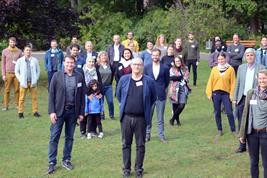16.10.2020
Press Release

The week from 5 to 9 October 2020 at the Leibniz Centre for Agricultural Landscape Research (ZALF) was dedicated to the promotion of young scientists. Supported by the German Research Foundation (DFG) and organized by ZALF, the “Agroecosystems 2020” Young Researchers Academy was held with a total of 20 participants. An intensive workshop program gave the young researchers an opportunity to network and receive individual advice on the structure, methodology and financing of their research projects. Within the framework of the Academy, the participants can also apply to the DFG for funding for their own research project.
For one week, the participants of the “Agroecosystems 2020” Young Researchers Academy met at ZALF for workshops, keynote speeches and individual coaching in order to gather ideas for their own research projects and also to obtain successful funding applications from the DFG. The aim of the Academy is to promote young researchers from various disciplines who, after completing their doctorate, want to implement a project in the field of sustainable, resource-saving and environmentally friendly land use. The Academy’s participants can also apply for project funding from the DFG for their project as part of the program. If they are granted funding, they could lead their own research project for a period of two years and thus take an important step in their career.
The Academy was initiated by Prof. Dr. Frank Ewert, Scientific Director of ZALF and Prof. Dr. Steffen Kolb, head of the ZALF working group “Microbial Biogeochemistry” and co-head of the “Landscape Functioning” Research Area. A total of more than 60 young researchers had applied to take part in the Academy. From these, 20 outstanding participants were selected through an evaluation procedure.
16 renowned experts from various disciplines were also invited to the Academy. After presenting their research project, the participants had the opportunity to have individual coaching discussions with some of these experts.
Dr. Kathrin Grahmann, a junior researcher in ZALF’s Research Area 2 “Land Use and Governance”, participated in a total of six of these discussions. “This helps me to define my scientific research question more precisely and to focus the framework of my planned project on nitrate leaching in diversified agricultural landscapes. Speaking to one of the experts gave me the idea for the integration and application of a new scientific methodology. It is rare to get such varied feedback from successful scientists”, reports Grahmann.
Dr. Christian Kraus, research assistant in the working group “Plant Protection in Viticulture, Mycology” at the Julius Kühn-Institute in Siebeldingen was also able to gather new stimuli: “I want to investigate the influence of mechanical pruning of vines on the roots of the plants. The coaching discussions showed me that the idea for my research question is basically good, but that I could still formulate my hypothesis and the funding application differently.”
Professional exchange among the participants and synergy effects are desired in the Academy: “Interdisciplinarity is important in agricultural research and is what distinguishes ZALF. The topic of land use can be approached, for example, from the perspective of a microbiome researcher or an expert in robotics. For some of the Academy’s participants it was new to learn about the perspective of other disciplines with regard to their research topic. We welcome the fact that the young researchers learn from each other and cooperate with each other in their projects and for funding applications”, explains
Prof. Dr. Steffen Kolb.
Following this workshop week in Muencheberg, the participants of the Academy will apply for project funding from the DFG. “Of the research projects presented here, all of which are excellent, about half can be funded by the DFG for two years following the Academy,” says Kolb. For the young researchers, a funding commitment would be an important milestone for their post-doctoral scientific career: With DFG funding, they would be able to lead their own research project.
 Press release as PDF file
Press release as PDF file
Pictures
For downloading the pictures please click on a picture and use the icon.
 .
.
